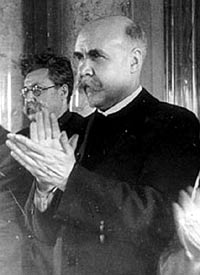Boris Pavlovich posers
Boris Pavlovich Posern ( Russian Борис Павлович Позерн * June 25 jul. / 7. July 1882 greg. In Nizhny Novgorod ; † 25. February 1939 in Moscow ) was a Russian revolutionary and Soviet statesman.
Life
Boris Posern, the son of a doctor of German descent from Nizhny Novgorod, studied at the Medical Faculty of Moscow University from 1900, was excluded from revolutionary activities because of 1902 and exiled to Siberia . As early as 1902 he joined the Social Democratic Workers' Party of Russia (RSDLP). Returned to his hometown in 1903, he was once again revolutionary among students there and in Samara . In the years up to 1917 poser worked illegally in Moscow, Vologda and Minsk under the code name Stepan Slobin for the Bolsheviks . The professional revolutionary was imprisoned several times during that time.
After the February Revolution , he was the first chairman of the Minsk Soviet and became a member of the All-Russian Central Executive Committee . From July 1917 he was a member of the Petrograd Party Committee and at the end of July a delegate of the VI. RSDLP party congress (B). In preparation for the October Revolution , posers were sent from Petrograd to Pskov to the staff of the Northern Front. After the October Revolution he became Commissioner of the Staff of the Northern Front. From March to May 1918 Posern was a member of the War Commissioner of the Petrograd Soviet and then from May 1918 to May 1919 War Commissioner of the Petrograd Soviet. In June 1918, together with Urizki and Joffe, he advocated the abolition of the death penalty . From September 6, 1918 to May 20, 1919 he was Commissioner of the Petrograd Military District. In December 1918 he was appointed a member of the Military Council of the Baltic Fleet . From June 5 to August 1, 1919 Posern was a member of the Revolutionary War Council of the Western Front, from August 4, 1919 to January 15, 1920 in the same position on the Eastern Front and from February 3 to December 5, 1920 a member of the Revolutionary War Council of the 5th Army of the Red Army .
From 1921 to 1922 Posern was President of the Headquarters of the Textile Industry at the Supreme Economic Council of the RSFSR . 1926–1933 he worked in the Leningrad Regional Committee of his party; was among other things head of the department for culture and propaganda. On the XVI. Congress of the CPSU (B) In 1930 he was elected as a candidate for the party's central committee.
From 1937–1938 he was a public prosecutor for Leningrad Oblast, a troika that passed death sentences against " enemies of the people ".
Boris Posern was arrested on July 9, 1938, condemned as an "enemy of the people" and shot on February 25, 1939.
Works
- Оппозиция на XV партконференции (The opposition at the XV Party Conference)
- Moscow and Leningrad 1928: Как оппозиция обороняет СССР (How the opposition "defends" the Soviet Union)
- Leningrad 1925: Posern and others: Коммунистическая партия и крестьянство (The Communist Party and the Peasantry)
- Leningrad 1931: Новые задачи и новые условия работы инженерно-технических работников (New tasks and working conditions for engineering-technical personnel)
literature
- Anatoly Rybakov : Years of Terror . Novel. German by Juri Elperin . 440 pages. Deutscher Taschenbuch Verlag (dtv 11590), Munich 1992, ISBN 3-423-11590-4
Web links
- WorldCat entry
- Entry at hrono.ru (Russian)
- Entry from the Great Soviet Encyclopedia Edition 1959 at dic.academic.ru (Russian)
- Entry at az-libr.ru (Russian)
- Entry in the Russian-European Encyclopedia (Russian)
Remarks
- ↑ The novel Years of Terror by Anatoly Rybakov is a narrative attempt to come to terms with the Stalinist purges . The author adds a documentary ending to the 16th chapter of the novel. Rybakov writes: "All of Kirov's comrades in arms ... were liquidated ...: Tschudow , Kodazki , Alexejew , Smorodin , Posern, Ugarow and Struppe ..." (Rybakow, p. 208, 10. Zvo)
- ↑ The XV. CPSU party conference took place in Moscow from October 26th to November 3rd, 1926.
Individual evidence
- ↑ Boris Pawlowitsch Posern in the Russian Jewish Encyclopedia (Russian)
| personal data | |
|---|---|
| SURNAME | Posern, Boris Pavlovich |
| ALTERNATIVE NAMES | Позерн, Борис Павлович (Russian); Pozern, Boris Pavlovič; Злобин, Степан (Stepan Slobin) |
| BRIEF DESCRIPTION | Russian revolutionary and Soviet statesman |
| DATE OF BIRTH | July 7, 1882 |
| PLACE OF BIRTH | Nizhny Novgorod |
| DATE OF DEATH | February 25, 1939 |
| Place of death | Moscow |
